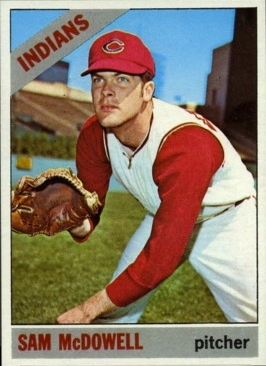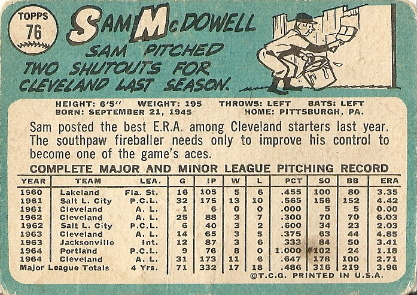The Night I Saw Sudden Sam
By Dr. Daniel Durbin | 4/16/12 |When you get to be a tired old man, sports never seem to be as innocent or fun as they were when you were in the bloom of youth. Ask Kobe.
What with the scandals and tired play and Democratic Strategist Hilary Rosen saying no one on ESPN has the right to comment on sports because they don’t play the game, sports have hit an emotional lull for these swift aging eyes.
A few weeks ago, I promised you kids I’d tell you the story of the night I saw Sudden Sam pitch. As that’s a story from my innocent youth when sports, of course, had no booze or womanizing or performance enhancing drugs, I thought I’d pass along this little tale on this cool Sunday evening.
So, pull up a chair.
As I’ve mentioned, I only saw two professional sports events live when I was a kid. One was a Giants baseball game in 1967. Four years later, my folks surprised my brother and me with the news that they would be taking us to an Oakland A’s game.
The first month of the 1970 Major League Baseball season was punctuated by the massacre of students at Kent State University by National Guardsmen, as the United States continued to tear itself apart over a variety of social issues. Little of this raised any notice on Major League Baseball diamonds where players continued to have hair neatly cut well over the ears and a hippie beard was as unthinkable as an internet blog.
The A’s were a little over a year away from becoming the long-haired mustachioed “Swingin’ A’s” who would bring the revolution to the Major Leagues and dominate baseball for the first half of the “me decade.”
In 1970, the A’s were the definition of a second place team. Loaded with young talent (including a monumentally slumping Reggie Jackson) but never able to put that talent together into a championship drive, they were perpetually second tier behind the powerful Minnesota Twins and the super-powerful Baltimore Orioles.
Sometime around mid-June of 1970, just as Jim Bouton’s Ball Four was released with its stories of endless (and rather adolescent) skirt-chasing and pill-popping (greenies were the uppers of choice) among ballplayers, my folks told me to get out my A’s schedule.
They wanted me to go over it with David (the brother who has always been eleven months older than me) to find a good game for the second week of August. That week, the A’s were scheduled to play the Cleveland Indians and the Orioles.
I voted for an Indians game. My parents and brother stared back at me as if I had suddenly decided to smoke one of those funny little pipes that seemed so readily available in Haight-Ashbury.
The Orioles were THE Orioles. Frank Robinson, Brooks Robinson, Boog Powell, Jim Palmer, Dave McNally, Don Buford, Paul Blair . . . they were the stuff of legend. You told your grandkids about seeing them play.
The Indians were, well, the Indians. They were from Cleveland. How good could they be?
The only thing of any note about the Cleveland Indians was a fearsome fireballer named Sudden Sam McDowell. Sudden Sam had a supersonic fastball. The name “sudden” came from the apocalyptic speed with which the ball leapt from Sam’s hand to home plate.
Catchers had to take longterm disability after catching Sudden Sam. It’s said that the sonic boom of his pitches can still be heard echoing in the muggy night air of late-summer Cleveland.
No one knew why Sudden Sam should be gifted with such devastating speed, least of all Sam. It was a freak of nature.

Now, my logic for picking the Indians game was that the A’s would surely be creamed by the baseball gods of Baltimore. With the patsy Cleveland Indians, they would have a better than even chance of coming away victorious.
For once, my folks listened to me (they generally listened to David on all subjects---and he was the one to get the bicycle and the car---but, I digress) and on August 13, 1970, we entered the Oakland-Alameda County Coliseum with 7,640 other sports fans to see the A’s and the Indians take the field.
You can imagine my dismay when the starting lineups were announced and the name “Sam McDowell” droned from the P.A. system. A cloud of foreboding suddenly descended on the Coliseum. Things could only get worse. And they did.
Johnny “Blue Moon” Odom, the A’s starting pitcher, threw the first pitch of the game gently over the heart of the plate. The Indians’ leadoff hitter, Vada Pinson, immediately deposited the pitch in the right field bleachers. Score, 1-0, Indians, McDowell pitching---we might as well have stayed home and listened to Harry Caray and Monte Moore tell us of the slaughter that was sure to happen to A’s batters for the next two hours.
Sure enough, McDowell mowed down A’s batters for two innings, three strikeouts, two weak pop flies, and a ground out. Then, something strange happened.
With one out in the third, Tony LaRussa walked. Tony LaRussa, yes, THAT Tony LaRussa, with fewer than 40 hits in his entire Major League career and a .199 lifetime batting average, walked. You could feel the earth itself shake in wonder.
Suddenly, the floodgates were opened for errors by the Indians and hits by the A’s. When the dust had cleared, Tommy Davis (“This Bat for Hire”) stood on third after having knocked in three runs and the A’s led 3-1.
The runs seemed to wake up a momentarily distracted McDowell and, from that point on, he was untouchable. McDowell crushed the A’s for the rest of the evening. The Indians scored three runs to retake the lead and the game ended with a Cleveland victory, 4-3.

The next day, in the papers, McDowell admitted that he had gotten bored and his mind had drifted at the start of the third inning. After walking LaRussa, it had taken the hit by Davis to shake him out of his indolence and reignite his interest in the game.
This was the Achilles heel in McDowell’s career. Sudden Sam had a pitch that could knock over a good-sized heifer. Baseballs shot from his lanky and lazy left arm like rounds from a Howitzer. His talents were so great, McDowell often drifted in and out of a game from sheer boredom.
After all, when you’re Pretty Boy Brad Pitt in “Troy,” it can be awfully hard to take an interest in the fight until the kill. But, Achilles, whether in the body of PBB Pitt or an overwhelming talent like McDowell, does have a fatally flawed heel. McDowell’s eventually cost him dearly.
McDowell won the 1970 Pitcher of the Year Award put out by the Sporting News. But, his body was already feeling the toll of ten years in professional baseball and his taste for alcohol was just beginning to impact both his mind and body. McDowell lost his focus and his livelihood.
McDowell’s career would disintegrate over the next four seasons with startling suddenness. By 1976, he would be out of baseball. By the early 1980s, a growing alcohol addiction cost him his marriage, all his money and his self-respect. He moved back in with his parents.
At the bottom, McDowell regained the focus he found after the Tommy Davis double one cool August night so long before. He cleaned himself up and started life over. He entered the University of Pittsburgh seeking a degree in sports psychology and addiction. Eventually, he was able to work in the Major Leagues again as an addiction specialist. He continues to work with players who seek his help.
In the United States, we love a redemption story. We cheer and celebrate a story of personal redemption like Sudden Sam’s. With our egalitarian spirit, Americans like to think that everyone has a chance at redemption. We like to think that even the devil may be redeemed and even Achilles may be saved from his own fatal flaw. If it can happen for them, it can happen for us.
Sadly, Sudden Sam has always been the exception, not the rule. His was an exceptional talent. When all was lost, he found exceptional clarity.
But, the sports world is littered with the corpses of those who destroyed their own great talent and never recovered. We don’t celebrate their stories. If it can happen to them, it can happen to us. We don’t like to think that, perhaps, we might be one of those beyond redemption.
In any case, that’s the story from over here on the west side. A story from my youth when sports heroes were real heroes without a hint of scandal or booze or performance enhancing drugs. I hope you remember that the next time you think the sun rises and sets on your pampered stars of today.
And don't even get me started on why "Have Gun Will Travel" was the last real television show . . . Kardashians . . . you can't be serious . . .

COMMENTS